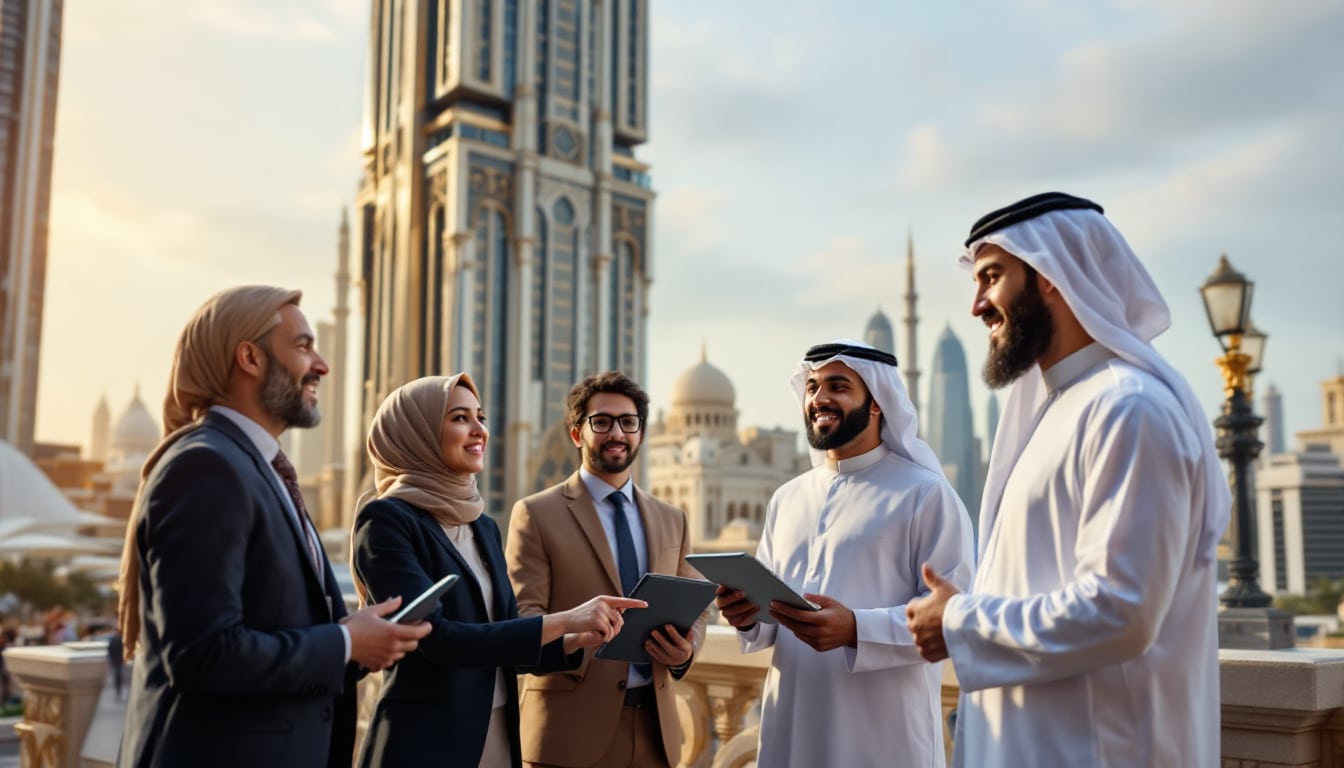“`html
Welcome to our space dedicated to privacy.
Your trust is at the heart of our priorities.
Discover how we protect and use your data.
We use cookies and data to maintain our services and ensure a smooth experience. Our systems monitor interruptions to prevent spam, fraud, and other abuses. By analyzing audience engagement and site statistics, we better understand how our services are used and improve their quality. You have the choice to accept or decline the use of certain cookies, which affects the content and advertisements you see.

Table des matières
ToggleKey Economic Trends in the Arab World
The Arab world is experiencing an economic transformation marked by initiatives aimed at diversifying revenue sources and reducing dependence on hydrocarbons. Countries like the United Arab Emirates and Saudi Arabia are heavily investing in sectors such as tourism, technology, and renewable energy. This diversification is essential to ensure sustainable growth and create new opportunities for local and foreign businesses.
Moreover, the economic reforms introduced in several countries in the region aim to improve the business climate. The simplification of administrative procedures and the establishment of free zones are increasingly attracting international investors. These initiatives contribute to boosting foreign direct investment and strengthening the economic position of Arab nations on the global stage.
Additionally, the rise of fintech in the Arab world is revolutionizing the financial sector. Innovative startups are emerging, offering solutions tailored to the specific needs of the region. This dynamic fosters financial inclusion and facilitates access to banking services for a broader population.
For a detailed analysis of current economic trends in the region, check out this article from The Silver Business.
Public Policies Impacting Arab Businesses
Public policies play a decisive role in the development of businesses within the Arab world. Governments are implementing structural reforms aimed at creating an environment conducive to entrepreneurship and innovation. For example, legislation favorable to startups and tax incentives encourage the creation and growth of new businesses.
Furthermore, initiatives in education and training aim to equip the workforce with the skills necessary to meet the demands of the modern market. Partnerships between the public and private sectors facilitate access to vocational training and higher education, thereby preparing young generations to actively participate in the local economy.
Sustainable development policies are also at the core of government strategies. Promoting eco-friendly practices and transitioning to renewable energy sources are major priorities. These efforts contribute not only to environmental preservation but also to the creation of new green industries.
To learn more about the impact of public policies in the region, visit this article from The Silver Business.
Investment Opportunities and Finance in the Region
The Arab world offers a multitude of attractive investment opportunities for international capital. The real estate, healthcare, and information technology sectors are particularly promising. Modern infrastructures and ambitious projects, such as smart cities and technology parks, attract investors seeking high returns.
The financial sector of the region is also diversifying, with the emergence of dynamic stock markets and new financial instruments. Local banks are modernizing and adopting advanced technologies to provide more efficient and secure services. This evolution enhances investor confidence and facilitates cross-border financial transactions.
At the same time, the sovereign funds of Arab countries play a crucial role in financing large-scale projects. These funds invest in strategic sectors, thereby supporting economic development and technological innovation. Transparency and rigorous management of these funds are essential to attract more international investors.
To explore financial opportunities in the Arab world, check out this article from The Silver Business.
Digital Transformation and Innovation in Arab Businesses
Digital transformation is at the heart of the strategy of Arab companies seeking to remain competitive in the global market. The adoption of technologies such as artificial intelligence, big data, and the Internet of Things (IoT) enables companies to optimize their operations and better respond to customer needs.
Innovation is also encouraged by governmental and private initiatives. Incubators and startup accelerators support entrepreneurs in developing innovative solutions. This creative dynamism contributes to the emergence of a vibrant and diverse digital economy.
Investments in research and development (R&D) are essential to stimulate innovation. Arab companies are increasingly collaborating with academic institutions and international research centers to develop new technologies and enhance their products and services.
For an in-depth perspective on digital transformation in the region, visit this article from The Silver Business.
Geopolitical Perspectives and Economic Stability
Geopolitical perspectives play a decisive role in the economic stability of the Arab world. International relations, trade agreements, and geopolitical tensions directly influence investment decisions and business confidence. A politically stable region attracts more foreign investments and fosters an economic climate conducive to growth.
Regional cooperation is essential to enhance economic resilience against global challenges. Initiatives like the Arab Economic and Monetary Union (AEMU) aim to harmonize economic policies and promote regional integration. These efforts contribute to creating a stronger single market and facilitating intra-regional trade.
Moreover, diversifying economic and political alliances enables Arab countries to reduce their vulnerability to external shocks. Partnerships with economic blocs such as the European Union and Southeast Asia open new avenues for trade and investment, thus strengthening the economic stability of the region.
For a detailed analysis of geopolitical perspectives in the Arab world, consult this article from The Silver Business.
Case Study: Inclusive Growth in the United Arab Emirates
The United Arab Emirates position themselves as a model of inclusive growth through innovative economic policies and world-class infrastructure. The country’s visionary leadership has led to initiatives aimed at fostering an equitable distribution of wealth and creating opportunities for all segments of society.
A notable example is the silver economy project, which aims to develop non-oil sectors to diversify the economy and reduce dependence on hydrocarbons. This initiative creates job opportunities in areas such as technology, tourism, and financial services, thus contributing to sustained and inclusive growth.
Moreover, education and vocational training programs are being strengthened to equip the workforce with the necessary skills in emerging industries. Partnerships with international institutions and global companies facilitate the transfer of skills and encourage local innovation.
To learn more about the potential for inclusive growth in the United Arab Emirates, check out this article from The Silver Business.








